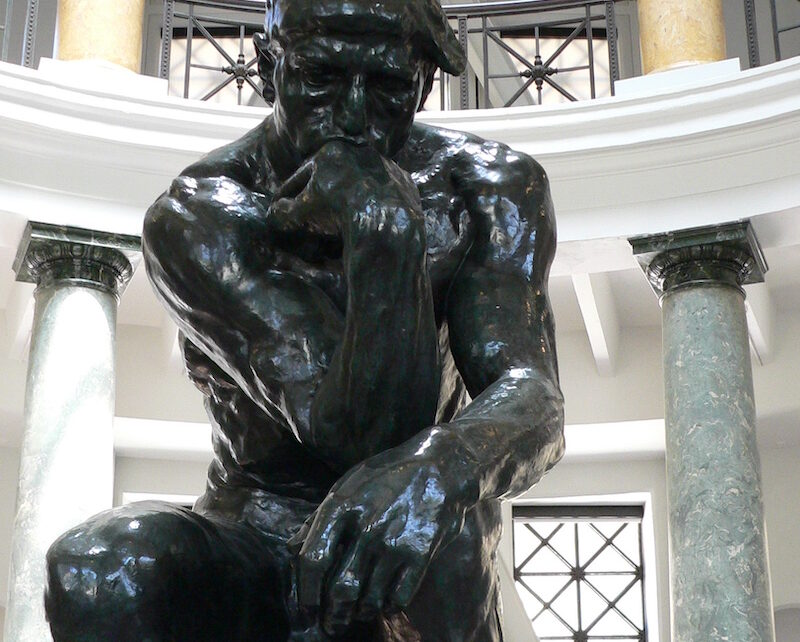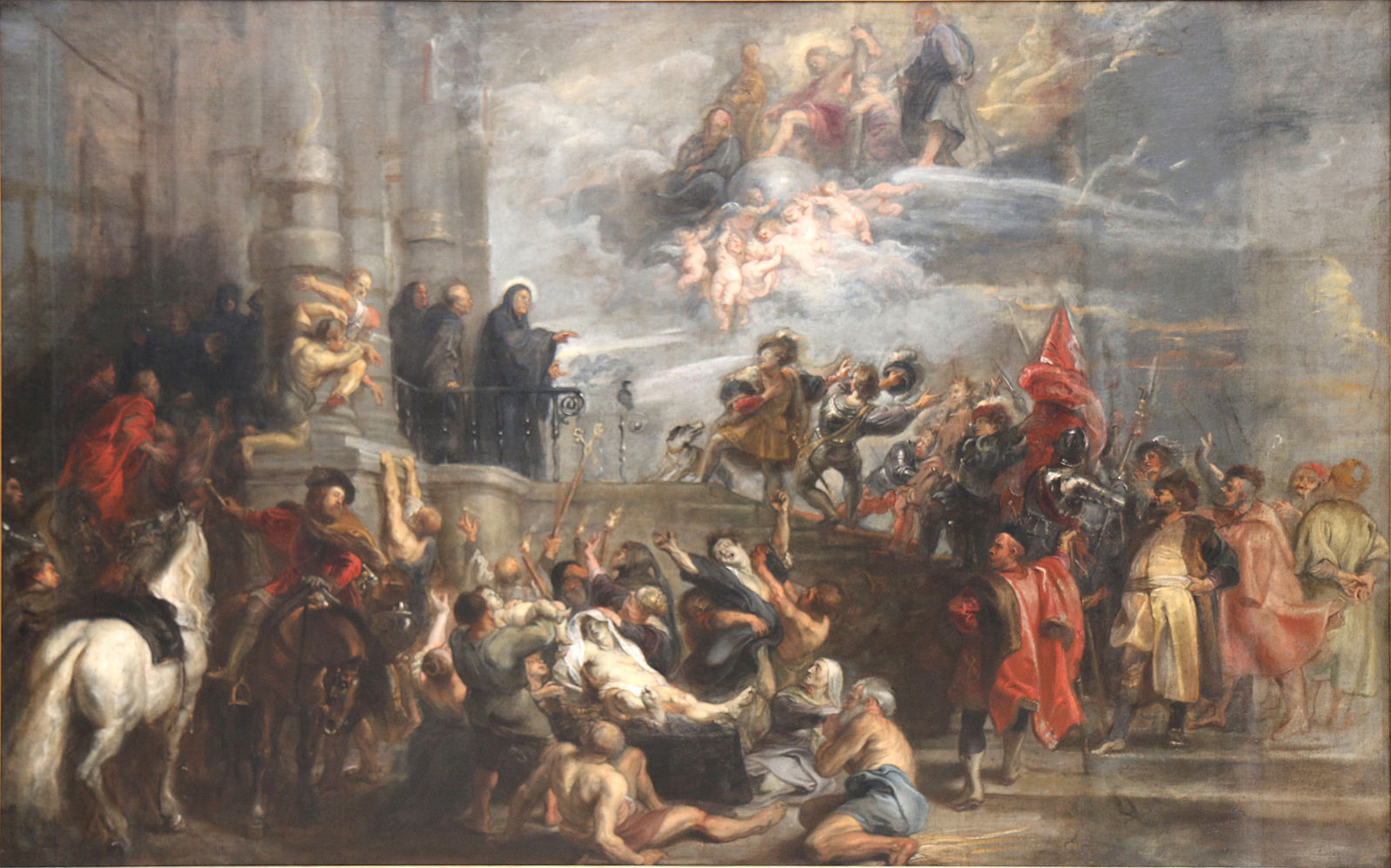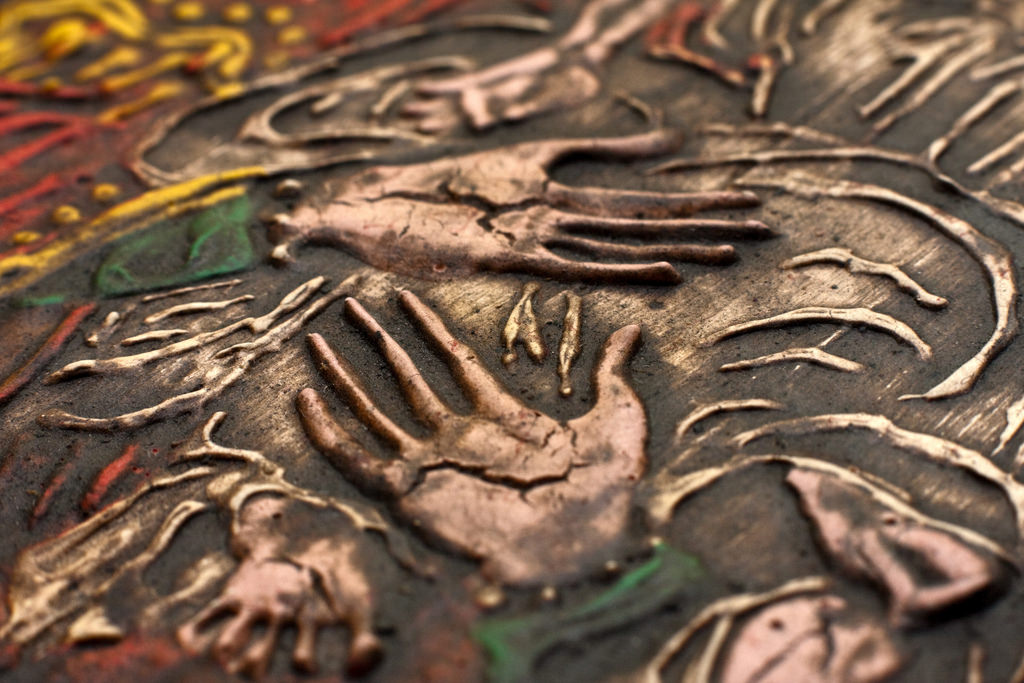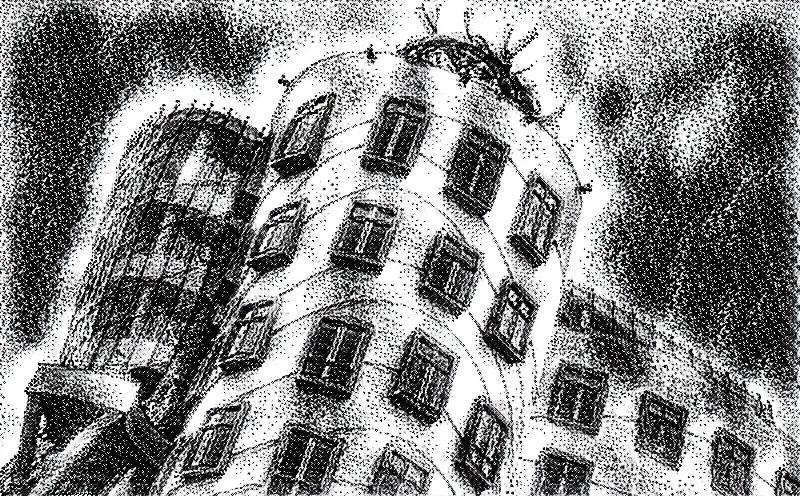The following is the third of a three part-series. The first can be found here, the second here.
Planning and Religious Thought
Where planning fails, despair grows. Only where despair grows, hope can rise. Where hope rises, thought reconnects with (the philosophical equivalent of) Love, thanks to a “certain” – ambiguity intended – faith and trust. Planning is indeed hopeless. It will not rely on what it cannot itself achieve. Planning is also faithless. The strategic “discovery” of a world-as-it-is relies exclusively on method. Planning needs a reason for everything (remember Leibniz’ Grand Principle) whereas hope only dawns when we have run out of reasons.
Only where planning fails, despair grows. But precisely because planning stumbles upon its limits, despair is at the same time hope. Hope can only come from despair, from the experience that we are left without reason. No hope without despair. When the whole therapeutic arsenal is used up and no recovery in sight, the doctors leave the room and someone lights a candle.[1] The situation shifts from planning to hope through despair. The thought that can see how hope comes out of despair is certainly not itself a variation on planning. Nevertheless, it is actual, real thought; it could be philosophy. It thinks the limits and the reach of planning.
Philosophically, hope can only hope for itself, without any external reference. Such reference would only turn hope into desire or expectation, even calculation or guarantee. Then what could be the sense – and not the use, as modernity’s imperative – of hope in the real world? Well, hope defies globalization that is nothing but the world turning into (a financial-industrial or capitalist) plan, only because this ambition itself defies and destroys hope.
Those limits of planning reveal the scope of human action and thought, or at least the fact that there is a limited scope. Since hope has neither object nor reason (outside itself), in which case it would become a form of extrapolation, it thinks in the register of accident. Whereas in traditional metaphysics accident meant secondary attribute, in modern metaphysics or technology accident means failure. Where technology breaks down, accidents will happen.
When thought becomes hope instead of planning, accident is whatever befalls. It is not negative, as in planning, but rather promising, though there is no guarantee or certainty about what precisely is being promised. Hope can only be “for the best”, without this “best” having any content, object or reason. This “best” only acquires its meaning within hope. Outside hope it becomes a plan where “better” can be measured and often just means “more.”[2]
The register of hope is different from that of planning. The change of register becomes “visible” where the philosophical connotation of “accident” changes from negative to positive – which is just one of many shifts, but it serves as a “good example” here. Planning only recognizes a future that cannot be anything more or else than extrapolation of the present, the present being a constellation that only differs from former ones in that it is supposed to be “better.”
The criteria to establish this “better” are provided by planning itself and are therefore other than hope’s “best.” As long as one stays within the epistemological monopoly of planning, the world is becoming better. This is established objectively in the sense of: measured. The present is the time-rod of technology, of planning. Hope shifts this rod to advent or accident, which is the future that is not the product of extrapolation of the present. It is concerned with the impossible. The impossible is not what is clearly not possible on scientific or technical grounds, but what arrives from beyond what we can imagine (i.e. calculate) as possible. This shows how we can have absolute faith in technology and science, though its extrapolations and equations are not guaranteed over time.
No law in science can claim that it will still be valid in the world tomorrow.[3] We have a hyperreligious faith in science. We are absolutely convinced, we are certain that the laws of gravity will still hold tomorrow, though science itself cannot account for this certainty; modern philosophy takes care of that.[4] Nevertheless, we trust science to account for it through our idea of objectivity. This idea turns faith into certainty and then amputates the former from thought.
Thought in the register of hope and faith, accident and promise, (re‑)enters the element of the religious. At this entry, there is no – or in any case: not yet – Church, confession, or systematic dogmatics. There is only philosophical faith. It is the faith where Plato finds agathon and where Heidegger thinks thankfully Seinsgabe.[5] Thought gratefully enjoys the faith that there will always be meaning and that thought will never dissolve in complete absurdity (in Levinasian sense). The thought that takes leave from the system of objectivity no longer experiences meaning as evidence, as signification, as adaequation rei et intellectus.
Faith has always been the element of thought, even when modernity tended to blur this element with objectivity and certainty. Hope has always been the basic moral motivation of thought, even when modernity thought it could replace it by method and planning. Love is not a being, nor is it a concept. It cannot be (the concept, category, predicate, definition, etc. of) a Supreme Being. A philosophy that has become Love cannot be metaphysical in the traditional, i.e. onto-theo-logical sense. Love cannot serve as a hinterweltlich or outerworldly principle.
The philosophical reliance on or access to any “external” reference was already closed off by Nietzsche, in his famous ‘How the “True World” Finally Became a Fable,’ the fourth chapter of Twilight of the Idols. Love cannot be the label of a scientific research project or a theory. It cannot be measured from a distance. Therefore, it also cannot serve as “internal” reference. This reference is also losing its status of absolute reliability since it is not at all certain that the legitimation by performativity (Lyotard) will save this reference. Love, hope, and trust are not about that kind of performativity.
Hope opens the reach of planning, takes planning out of itself. It shows that planning does not have the last and ultimate word or explanation. Beyond the limits of planning is not “non-thought”, like poetry or sentiment or absurdity, but a thought that is at the same time less and more than planning. It opens a world at the price of alleged certainty. Faith saves hope from pointlessness. Both are oriented towards advent, to what is coming, promised or promising.
But what is coming cannot come from another world since this Hinterwelt has been emptied, closed off. That is what we learn from the experience of the death of God, as prophesized by Nietzsche. On the other hand, Heidegger as well as Wittgenstein contend that the world cannot generate or even hold its own (full, definite) meaning. Then, where does this meaning come from, if there is no world but this one, philosophically speaking?
Decardinalization
Hope has been shown to be the moral motivation of thought, opening philosophy to a “better” world without this “better” being measurable, predictable, derivable from what is considered “good” in the technoscientific world. In the same vein, faith can be shown to be the epistemological motivation of thought, the basic trust that we will never be left in total absurdity. Love will be explored here as the ontological, hermeneutical motivation of thought.
The moral agenda of current thought does not consist in the construction of a separate, rational, liberal, or communal ethics, but in the extension of philosophy from planning to Love,[6] from certainty to openness, from veritas to caritas. Decardinalization is not about amorality or immorality, but about thought itself becoming moral instead of virtuously reflecting on virtues, values, and norms.
The element of the religious is motivated by Love, so Christianity informs us. Here, in this philosophical essay, this motivation refers to a thought that opens up to a truth that is not necessarily the result of calculation, a truth that is not founded on certainty. In this approach, Love is about leaving a world open instead of enclosing it in a theistic structure. The ambition of total explanation, typical of technoscience, is the most articulate form of modern ambition.[7]
A charitable philosophy is one that aims at liberation from all too rigid method without applying any rigid method to this end, at salvation from absolute planning without planning this, and at liberation from a closed globe without promoting Love to Supreme Principle. This philosophy is something else than planning. From the viewpoint of planning, every other thought is nonsense, irrational. But when thought breaks away from the supremacy of planning through hope and faith, it recognizes the reasonableness of Love and the philosophical fertility of an open world, of an opening that is meaning. Philosophy that is focused on method will generate systems more geometrico demonstrata. No such system can sprout from Love. Philosophy that is focused on Love will never produce such systems.
A “promising” candidate in the running is deconstruction. Deconstruction of archaeology and teleology of philosophy, of alleged absolute foundations and aspirations of metaphysics, has dis-enclosed, has opened world.[8] A closed world, purely immanent and identical to itself, is closed off from meaning, is philosophically suicidal – and deconstruction appears as palliative care. Such a world will only acknowledge signification, a definite “adequacy to itself.” An open world experiences meaning as an event, as advent. Opening and meaning are synonymous verbs here, denoting the event of world or world as the event of sense.
Perhaps late-modern metaphysics, under what is still called deconstruction, finds itself more lenient towards hope and faith, and can therefore be said to be a suitable candidate to re‑attach Love to thought. Deconstruction is the name of the event that turns the closed world of traditional metaphysics into an open one. Meaning as opening (“world” as a verb) becomes a matter of “advent,” of to-be-given, of promise instead of originally and eternally given in a fixed system of concepts. Truth becomes a matter of reception rather than of deduction. Meaning happens all the time, not just at the origin (archaeology) or in its culmination (teleology).
This reason is secular in that it refuses to find the reason or the truth of the world in another world. It is also “desecular” in that it allows for meaning to arrive instead of being fabricated by method. Also, the very notion of the arrival of meaning rejects the possibility of a full explanation as aspired by science. It shows modesty and courage to welcome a register and enter an element that thinks the limits of planning.
Hope and faith lead thought into Love, where it experiences the world as a gift, not as a given that fits into an equation, or into a plan. Here, philosophy realizes that planning did not plan itself and that the system of objectivity is not objective itself, without the threat of absurdity.
All this implies that philosophy cannot think Love without becoming Love, without welcoming the event, without opening to the event of meaning. In the form or register of Love, thought leaves the theist structure that lends planning its absolute character. This cannot be accomplished by a superficial atheism like the one described above, where the theist structure is maintained and God is replaced by another principle. Here, only the concept and entity “God” are removed from the world. But it is still theism, with an operator tagged onto it. Philosophy should instead point its “a-” at all theisms, in the name of God.[9] It should destroy theisms in a Heideggerian sense, dissolving onto-theological metaphysics.
Philosophy has to become atheist ánd religious[10] in order to allow for a more appropriate configuration of thought, with planning and Love “united” through hope and faith – not through dialectics – as modes of thought. This is what I call desecularization. In all its complexity, it keeps secularization away from radicalization. A desecularizing reason will no longer hold planning to be the most appropriate response to the “turn towards the world” and the matching “expulsion of the holy” that is supposed to be typical of modernity.
So, in a way, desecularization saves thought from imminent suicide. Desecularization of philosophy, acknowledging the critique of metaphysics and the purport of Love, moves thought beyond Kant and Hegel. It renounces the immanence of the identity of the whole with truth and with thought, but it also renounces the transcendence of a God that eludes scientific thought and is evoked by another reason as “out there.”[11]
A closed and mechanized world, the world that calls out for or comes out of radical secularization, has no use for theological virtues. Or better, it “cardinalizes” those virtues. They seem to have been spread out over or between the cardinal ones. Only the cardinalization of moral thought can explain the appearance of “applied ethics.” One may well wonder whereof these ethics are the application, if not of a “broader” religious (not necessarily confessional) ethics. In a Christian world, philosophy could focus on freedom while theology took care of the dignity of the person.
Secularization disconnected freedom from dignity. Freedom became a matter of privacy and property, now both threatened by secularization itself as globalization,[12] i.e. the world turning into the form of a plan. The dignity of the person completely disappeared from the intellectual stage and became a mere matter of sentiment. There is, in a secularized or “disenchanted” culture, no science that can “deduce” or reveal, discover or formulate this dignity of the person. Contemporary philosophers like Nancy and Žižek, as mentioned above, discern the Christian provenance of this dignity that can never become a rational concept but will always be an appeal. This appeal cannot be answered in or by a theory. It presupposes thought to be Love.
Modern thought did not recognize its own appeal. It considered its contents the adequate representation of an objective reality in a conceptual structure. Therefore, it did not see how its philosophy was the answer to an inner appeal to turn reality into a rational and dual system of objectivity. The laying bare of this appeal is the effect of reality becoming deconstructive. Deconstruction is at the same time also decardinalization of ethics. This decardinalization keeps virtue away from the general notion that a better world can only come from adequate management. Decardinalization moves away from the systematization and application of ethics. It re-integrates the ethical into thought as such, turning thought into Love.[13]
Desecularization and decardinalization have reorganized the (moral, therefore still modern) relation between philosophy and theology.[14] Instead of pre-modern ancilla or modern dominatrix, philosophy has become amica theologiae.[15] Much can be said about this new relation. In connection with desecularization and decardinalization, I would formulate a conclusion as follows.
Metaphysics traditionally elaborated ethical systems, late-modern thought itself has become ethical itself. Now that thought has reconnected with hope and faith, not as topics but as its religious element, to think is in itself “good” and promises “better” worlding – in an eschatological rather than ideological way. Philosophy talked about hospitality, charity, and friendship and has now become Love, welcoming the advent of meaning. Paradoxically, at least from a theological viewpoint, philosophy had to become atheist, not in the shallow sense but in a deeply religious sense.[16] This religious atheism does not remove God from thought or replaces God with another Supreme Being. It has passed through the experience of the death of God and, in the name of God, dissolves theisms, theist structures, and onto-theo-logies.
Erik Meganck is a lecturer for FVG Antwerp (Belgium). He is the author of Nihilistische Caritas? Secula-Risatie Bij Gianni Vattimo (Peeters, 2005) and co-author of Philosophy and Polytheism (Walking the Worlds 2016) as well as numerous articles in international journals.
[1] The medical aim is clear. In the technological battle between the symptom and science, the latter wants to win the battle that is called illness. It wants to heal the patient, effect a cure, not for the latter’s sake but for the triumph. We can suspect this when we see how, in a medical environment a human being is readily identified with his symptom. Nurses do not refer to “mr. Johnson” but to “the kidney stone in room 16.” Doctors often are prepared to fight it out the hard way, which is known as “therapeutic aggression.” The candle is of a different order; it is cleansed through despair. It mustn’t be confused with magic. It only says: ‘We cannot but hope for the best, without knowing what the ‘best’ could be. It trusts that, whatever the outcome, it will be for the best.’
[2] Not being an economist, I am often amazed by financial bulletins where I read that industrial growth of a company is not enough; its growth itself should grow to be “better.” Is not this, again, a symptom of the “limits” of planning? And where can the long-term vision of exponential growth come in?
[3] The only way for rationalists and the like (positivists, scienticists) to suppress this problem, is to translate this hyperreligious, certain faith into the one and only true objective structure of reality.
[4] Aristotle observed exactly the same processes that are gathered under the term “falling” as we do. Nevertheless, he explained this phenomenon by referring it to the natural positions of things. We, after Newton, refer it to a gravitational force. Why and how is this “better?” Only because it satisfies the modern imperative of measuring and the also modern ban on teleology. But because we still live modernity and thought is still modern – even when we call it post-modern – we cannot but obey this imperative until it will have ‘dissolved’.
[5] There are plenty of examples that hint at the fundamental religious, faithful nature of thought. There is Parmenides, who presented his wisdom as a divine gift. Anselm’s Proslogion reminds one of a love declaration, with philosophy coming after, thinking about God’s existence. Descartes’ system hinges on his trust that a perfect God cannot be a malin génie. Kant trusts that the phenomenal order has a meaningful report to the noumenal order. Only Hegel is certain that Spirit will never fail a dialectic leap, because in his own philosophy, reality is finally explained as a whole.
[6] This is itself a movement of Love.
[7] Remember that this ambition hinges on the Supreme Being and the Principle of Ground. It seems not easy to determine whether the notions produced the ambition or the other way around. We do know that the notions and the ambition together make up metaphysics.
[8] This is what Nancy means with dis-enclosure. Jean-Luc Nancy. Dis-enclosure. The Deconstruction of Christianity. New York: Fordham University Press, 2008.
[9] Meganck, ‘World without end.’
[10] It would perhaps be more precise to call this philosophy hypo-religious, not only to contrast it with hyper-religious modernity (the solid certainty of science), but also to keep it away from religious in the confessional or denominational sense (the convinced, faithful belief). Hypo-religious would be the philosophical hope, trust and openness.
[11] And yet it would be interesting to find out whether it is easier to open up Hegel’s immanence by difference than to drag Kant’s God into the opening, into the difference between theoretical and practical reason, into the difference within reason.
[12] I just need to refer to the way social media invade privacy and to the unworldly arrogance of the financial “world.”
[13] Critique of metaphysics is in more than one sense ethical. It liberates us from the shackles of “violent” metaphysics, it welcomes an ‘eventual’ new advent, and it points at the thinker’s responsibility for his thoughts since he can no longer outsource this to a “true world,” a system of objectivity.
[14] Nietzsche famously tried to dismantle the traditional moral connection between philosophy and theology. Instead of disproving any kind of connection, the death of God gives rise to a new moral connection that can be called typical of late-modernity.
[15] Meganck, ‘Philosophia Amica Theologiae.’
[16] This “shallow” atheism does not belong to modern thought as such. Great modern or post-modern thinkers were more cautious than that. They did not shout that God does not exist, as so many others did and still do. They were often more concerned with the problems inherent to metaphysics and Christianity than with God and religion itself. See Erik Meganck, Religious Atheism. Twelve Philosophical Apostles. New York: SUNY – forthcoming.




